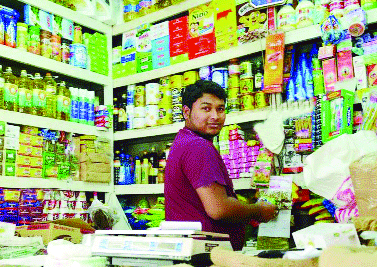Low-income group affected for commodity price hike
Industry Desk: Milk tea Tk7, black tea Tk6 – says a sign at a tea shop opposite a school in the Eskaton Garden area in the capital.
Asked why she has increased the prices, shop owner Jasmine Akhter, 40, promptly replied: “The price of tea leaves has gone up from Tk360 to Tk430 per kg, sugar has gone up from Tk60 to Tk80, condensed milk from Tk52 to Tk75. And there is cylinder gas which is now Tk1,300. What can I do but increase the price of tea?”
Not just the price of tea, the prices of all daily necessities, including chickens, eggs, onions, sugar, gas, flour and milk, have been increasing at an alarming rate, leaving low income people at a loss.
Jamal Sheikh, an electrician who came to have lunch at Bismillah Restaurant near Banglamotor, said, “The prices of all food items here have gone up, chicken curry has gone up from Tk40 to Tk60, and beef is now being sold at Tk100 instead of Tk80.”
He went on to say, “This morning I had to buy the Tk5 paratha at Tk7, Tk10 vegetables at Tk15 and Tk15 egg omelette for Tk20. If prices go up like this, it will be very difficult for low income people like us.”
Emran Hossain, manager of Bismillah Restaurant, told, “We have to buy all the items at higher prices, so we have no alternative to increasing the prices of food. If the government reduces the prices of items, we will be able to reduce the food prices.”
Babul Mridha, a mobile food shop owner at Eskaton Gardens, said that for the last four or five days, the shop has had to pay Tk2,000 to Tk3,000 more daily to buy raw materials. “The flour sack which was Tk1,800 five days ago is now being sold at Tk2,300, Tk45 onions are being sold at Tk80. So, I was forced to increase the price of food,” he said.
Mufazzal Hossain Bidyut came to the kitchen market at the BIAM Foundation alley of New Eskaton, where he bought a broiler chicken.
Expressing his displeasure, he said that the price of every daily necessity has gone up. Broiler chicken price has gone up from Tk120 to Tk190 per kg, soybean oil from Tk110 to Tk160, coarse pulses from Tk60 to Tk100 and prices of all kinds of vegetables have increased by Tk5-10.
“Having a job with a salary of Tk15,000, I am not able to maintain everything now, from paying house rent to buying food. I am at a loss what to do,” he added.
Poultry trader Nurul Amin told that the prices of chickens in the market have been increasing day by day, “so we also have to sell at the market rate. We have to buy broiler chickens at Tk175 per kg. At the same time, the price of a 25kg sack of chicken feed has increased from Tk650 to Tk850.
According to a survey conducted by the non-governmental organisation Brac in 64 districts of the country, the rate of extreme poverty has increased by 70%. Around 14% of people have no food at home. Among them are a large number of day labourers, construction workers and rickshaw pullers.
The survey was conducted between 31 March and 5 April this year.
A Research by the Bangladesh Institute of Labour Studies reveals that there are now an estimated 1.1 million rickshaws in Dhaka city.
These rickshaw pullers are among the low-income people who are in dire financial straits due to rising prices.
Hardpressed rickshaw-pullers are trying to pass some of the burden on to their riders. “We have increased the rickshaw fare from Moghbazar intersection to Banglamotor intersection from Tk20 to Tk25-30,” said Anwar Hossain.
President Joe Biden tests positive for COVID-19 while campaigning in Las Vegas, has ‘mild symptoms’
International Desk: President Joe Biden tested positive for COVID-19 while traveling Wedne…








